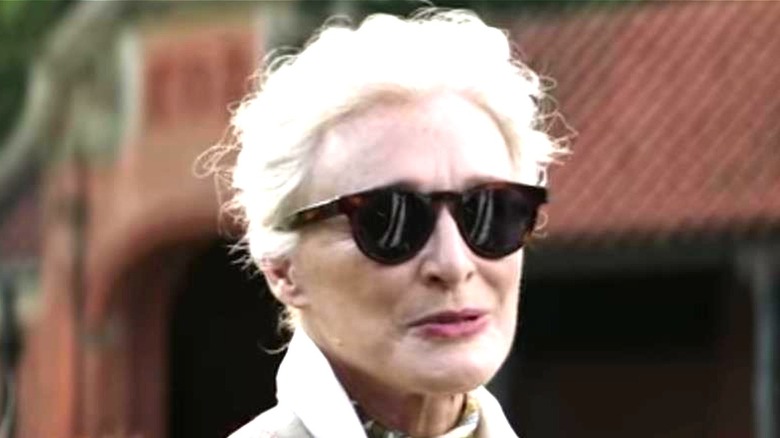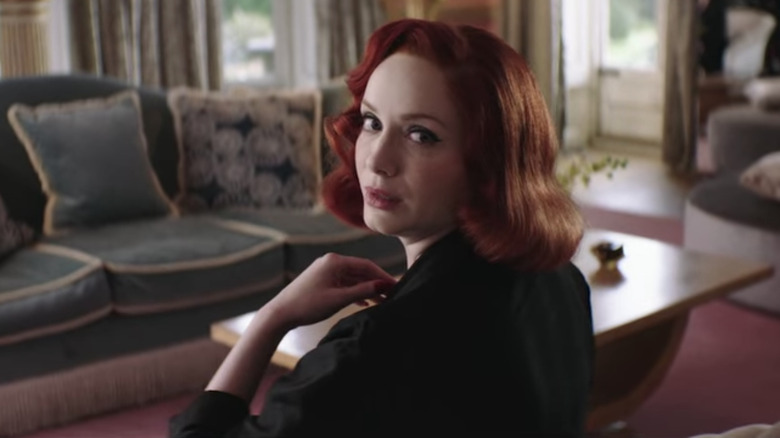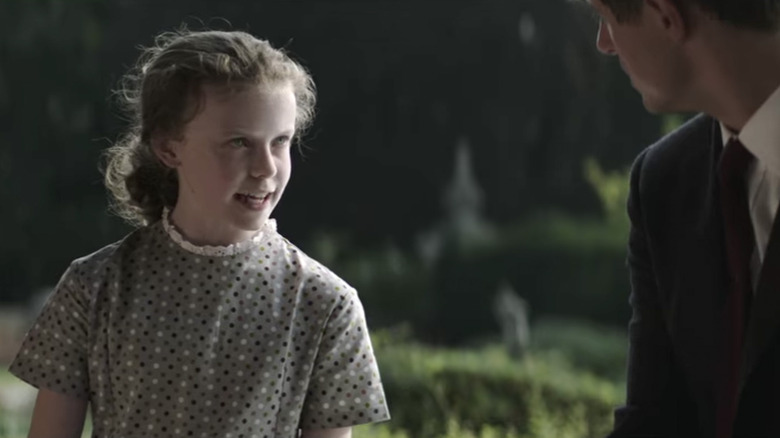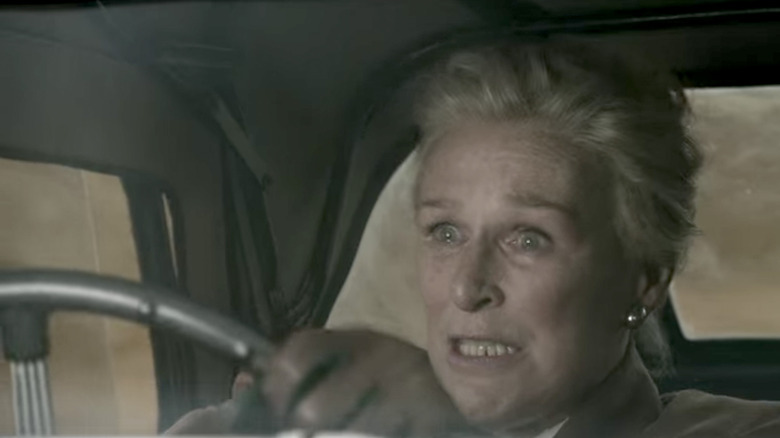The Ending Of Agatha Christie's Crooked House Explained
Recently made available for streaming on Netflix, the 2017 film "Crooked House" is garnering some newfound attention after its relative post-release obscurity. The murder mystery follows detective Charles Hayward (Max Irons) as he investigates the well-to-do Leonides family living on the outskirts of London after the family's patriarch, Aristide (Gino Picciano), is found dead under suspicious circumstances. An autopsy concludes that Aristide has been poisoned using his own glaucoma medication, eye drops which, if injected into the bloodstream, become lethal. Each member of the extended family living in Aristide's mansion has a financial motive to kill him, and the spoiled, selfish, and generally abrasive personalities of most of them make everyone a suspect.
Juicy, right? Well, it should perhaps come as no surprise that the film "Crooked House" is based on a 1949 Agatha Christie novel of the same name. Christie is known as one of the greatest mystery writers of all time and a pioneer of the modern murder mystery genre. Strangely enough, the author even lived through a mysterious episode of her own — an 11-day disappearance — that only aided her success as a novelist. Her influence can be found in some of the greatest mysteries of all time, but that doesn't necessarily mean that each film to adapt Christie's work meets her level of success. And that brings us back to "Crooked House." With a Metascore of 59/100, it really is the Christie signature plot-twist ending that makes this supposedly average movie worth the watch (via Metacritic). Here's that ending explained.
Blame it on the outsider
The primary suspect for Aristide Leonides' murder is his second wife, Brenda (Christina Hendricks), whom the family never trusted because of the couple's decades-wide age gap and Brenda's past as a dancer in Las Vegas casinos. There's also the added element of Laurence Brown (John Heffernan), the Leonides children's tutor and writer of Aristide's memoirs, who began an affair with Brenda shortly after his employment at the Leonides manor started.
Thanks to the snooping of the youngest of the Leonides clan, Josephine (Honor Kneafsey), the police find Brenda and Laurence's love letters, wherein they outline their plot to murder Aristide by replacing his insulin with his glaucoma medication. Things seem all neatly wrapped up until Josephine's nanny (Jenny Galloway) is murdered. With Brenda and Laurence already arrested for Aristide's murder, they couldn't have been responsible for the nanny's death, and the case of who killed Aristide is once again far from closed.
A new death ultimately leads to the discovery of the murderer
Josephine's nanny is found dead after she drank some cyanide-laced hot chocolate that Josephine had refused. This leads to another investigation, which ultimately points the finger at Lady Edith de Haviland (Glenn Close), who early on in the film had mentioned that she employed a variety of methods for killing the moles that are ruining her lawn. As Lady Edith whisks Josephine off to get an ice cream soda, Charles confirms that Edith had cyanide in her greenhouse but discovers Josephine's missing notebook buried in quicklime in an attempt to render it illegible. Charles and Sophia Leonides (Stephanie Martini) hop in the car to chase after Edith and Josephine, convinced a dangerous Edith has taken the innocent Josephine captive.
Charles and Sophia find waiting for them in Charles' car Edith's written confession to the murders, but as they chase after Edith's car, Josephine's notebook finally reveals the truth. The little girl herself had killed Aristide, out of boredom and revenge for not allowing her to pursue ballet. The nanny, too, had to go, as she was asking too many questions.
The revelation of Josephine's crimes refocuses the entire Leonides family dynamic. In an instant, Josephine goes from a precocious Sherlock Holmes type to just the same as the rest of the family, self-centered and believing that her family's status insulates her from the consequences of the real world.
... but not before it's too late
But why did Lady Edith want to cover up Josephine's crimes? Well, to start, she was never above suspicion, so the opportunity to take the fall was there if she wanted it. She was consistently evasive when it came to helping out with the investigation, never talking to Charles about Aristide's murder, only about the family in general. And when asked when she would be available for a proper interview, Edith replied that she was too busy pruning her flowers. Too busy tending to her garden to help out with the investigation of the murder of a loved one? Very fishy.
We then learn that Edith is terminally ill, with not much time left and no more potentially life-saving treatments on the horizon. Her special bond with Josephine is also steadily developed throughout the movie, with both characters speaking highly of each other and openly cherishing their relationship with Charles. So, with her death imminent, Edith attempts to cover up Josephine's crimes by confessing to the girl's murders, ruining her own reputation to save Josephine from a life of institutionalization and imprisonment. But the only way this would work is by killing herself and the girl so that the truth could never come out, so she drives the two of them off a cliff at a nearby quarry. Unfortunately, the quicklime never destroyed Josephine's tell-all notebook, and Edith's death was ultimately in vain.



